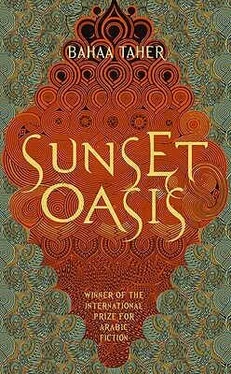It wasn't our smiling Fiona who told that story last night, but another Fiona, one whose face had emptied of blood and delivered her words sadly, one by one. When she'd finished,
Catherine asked her eagerly, 'Why did you cut the story short and leave out the beautiful poetry?' and Fiona replied, as she got up, 'That's enough for now. I'm tired this evening.'
Indeed, her painful coughing went on all night. It's getting worse day by day and with it my feelings of impotence. Sheikh Yahya's herbs haven't worked the same miracle as with Ibraheem, so what's to be done?. Catherine refused to agree to the two of them travelling to Cairo in the hope of finding better treatment and asked me the question I already knew the answer to: how? The journey would kill her. But her staying here will kill her too and kill me along with her. If Sheikh Yahya's intuition about her condition is correct, there's no hope, and there's still a long time to go before the hot weather when we can try the last possibility. Will she hang on till the summer comes and the sands get hot? Will she live? She has to live. If anyone deserves life in this house, it's her alone. Not me and not Catherine.
The sound of coughing became a little quieter, then stopped. I've grown able to distinguish the different types of cough quite clearly since Fiona moved to the ground floor. My hearing has become sensitive even to the sound of her breathing. What do I want from her? Nothing except that she live, just as Sheikh Yahya said that he wanted Maleeka to live so that the world could have some meaning. Why, then, can I not rid myself of her face, which pursues me at home, in the office and on the road, when I'm alone in bed and when Catherine is lying next to me? To what end will it lead us, that thing which comes unsought and cannot be escaped?
The cough started again, harder this time, and my heart began pounding. I had to go out, to get away. I jumped out of bed and Catherine didn't wake. Neither my movements nor her sister's coughing wake her. She has returned to her heavy sleep after the nights of moaning and groaning caused by the bruises made by the stones. The only worries that keep her awake are the temples of the ancestors! I wish that that day instead of throwing stones at her they'd…
No. Forgive me, Fiona. I don't wish any harm to your sister!
I washed quickly, dressed, and left the house.
The dark was still intense and there was a long time to go before the first streaks of dawn. I found no one awake at the station except for the soldiers of the night guard, whom my arrival at that hour greatly surprised. But as I crossed the courtyard I saw a phantom, whose identity I could not distinguish in the dark, moving as though to leave the place.
It was taken aback by me too, and came forwards, greeting me in embarrassment, then stood silent.
'Welcome, Sheikh Sabir,' I said.
I had seen him once following the assault on Catherine at the temple. He came to make a show of apologizing for what the zaggala had done, his words, as usual, hinting at other things. They carried a reproach to Catherine, 'because the lady went to the temple where these "ignorant" people suspect that she is practising magic', and a reproach to me because, since I'd permitted the lady to go to the temple, it would have been better to send a sufficient number of guards with her. Privately, I conceded that he was right, but I contented myself with thanking him and said I would take care it didn't occur again. Wasfi insisted that Sheikh Sabir should direct us to the zaggala who had carried out the assault so that we could flog them in front of everybody and make an example of them to others, but I said, decisively, that I accepted the apology of Sheikh Sabir and considered the matter closed.
In the dark courtyard, we stood facing one another without speaking. Finally, I said, 'Has anything happened, Sheikh Sabir, that requires the intervention of the police?'
He replied, with growing embarrassment, 'Not at all, not at all, Mr Commissioner. I was with the captain and… we were going over the accounts for the taxes.'
I laughed in spite of myself. 'You were going over them at this hour, Sheikh Sabir?'
'Yes. He told me before the dawn prayer. He likes to work early.'
'It's the early bird, indeed, that gets the worm. Goodbye, Sheikh Sabir.'
I left him and climbed the stairs to my office. One of the guards wanted to wake up Sergeant Ibraheem but I forbade him. I told him, 'We'll start work at the proper time, as we do every day.'
As soon as I went in, I felt cold, so I closed the open window and sat alone in the dark room. I need to be on my own and have this peace in order to think.
Think about what exactly? I'd become an addict of thinking about myself and every page I turned I found to be worse than the one before. Would that I weren't I! Would that I were my brother Suleiman, for example, that I were a merchant in Damascus and he an officer in the police. Why not?
The same father, the same mother — it's just a matter of luck. It would have been perfectly possible for luck to have taken my side, and then I would have been him. I haven't seen him for years and I've never seen his wife and children. His features have faded in my memory. He cut all his ties to the past and built a new life far from us, and I don't blame him for it. He never failed to fulfil his obligations, and during his mother's life he used to send her money, even though he was just starting his business and needed every piastre. Still, it hurt me deeply that he didn't come when I sent him the telegram announcing her death. He responded with a message of condolence in which he said there was no point in his turning up after the funeral and burial were over and it made better sense for him to distribute what he would have spent on the journey in charity, for the rest of the departed's soul. I had hoped at the time that he'd come and we could weep for her together. I was the one that needed him, though perhaps what he did was the more correct. If I had been
Suleiman, I wouldn't have lived this life of uncertainty. If I'd been Suleiman… If I'd been…
The marquee is large and I'm standing receiving condolences for Mahmoud Abd el Zahir, but all the chairs are empty and no one comes. A sheikh is sitting reciting the Koran on a high wooden bench but he opens his mouth and closes it without making a sound and no one comes. Then the marquee is a large garden crowded with people where lots of children are playing and I walk on my own, bearing on my outstretched hands the folded white cloth. I have stopped an old man and I ask him where the burial area is and he gestures without stopping and says, 'Straight on,' so I follow his directions and I find myself on the shore of a river that is edged with willow trees, whose branches dangle in the water, and I take hold of the hands of a beautiful young girl and we laugh together and I say to her, 'Can you imagine? I was dead but I came alive again!' and she says proudly, 'That's because of me.' We get into a boat on the river and I discover that she's Ni'ma and I laugh and ask her, 'When did you change the colour of your hair?' and she answers, 'When you left me.' Suddenly, though, she screams and points behind me and lots of people appear on the riverbank pointing where she did and I turn and find a huge crocodile, its mouth wide open, descending on the boat.
I take hold of Ni'ma's hand and we jump out of the boat together. We run quickly over the water and once again we're in the middle of the marquee amid the empty chairs and the voice of the reciter, which doesn't come out even though his mouth is opening and closing.
Ni'ma says in annoyance, 'Why doesn't that sheikh at least recite?' I go up to him angrily and find that he's not reciting but laughing. I know who he is from his eyes so I take hold of the front of his robe and say furiously, 'You, Sheikh…'
Читать дальше












